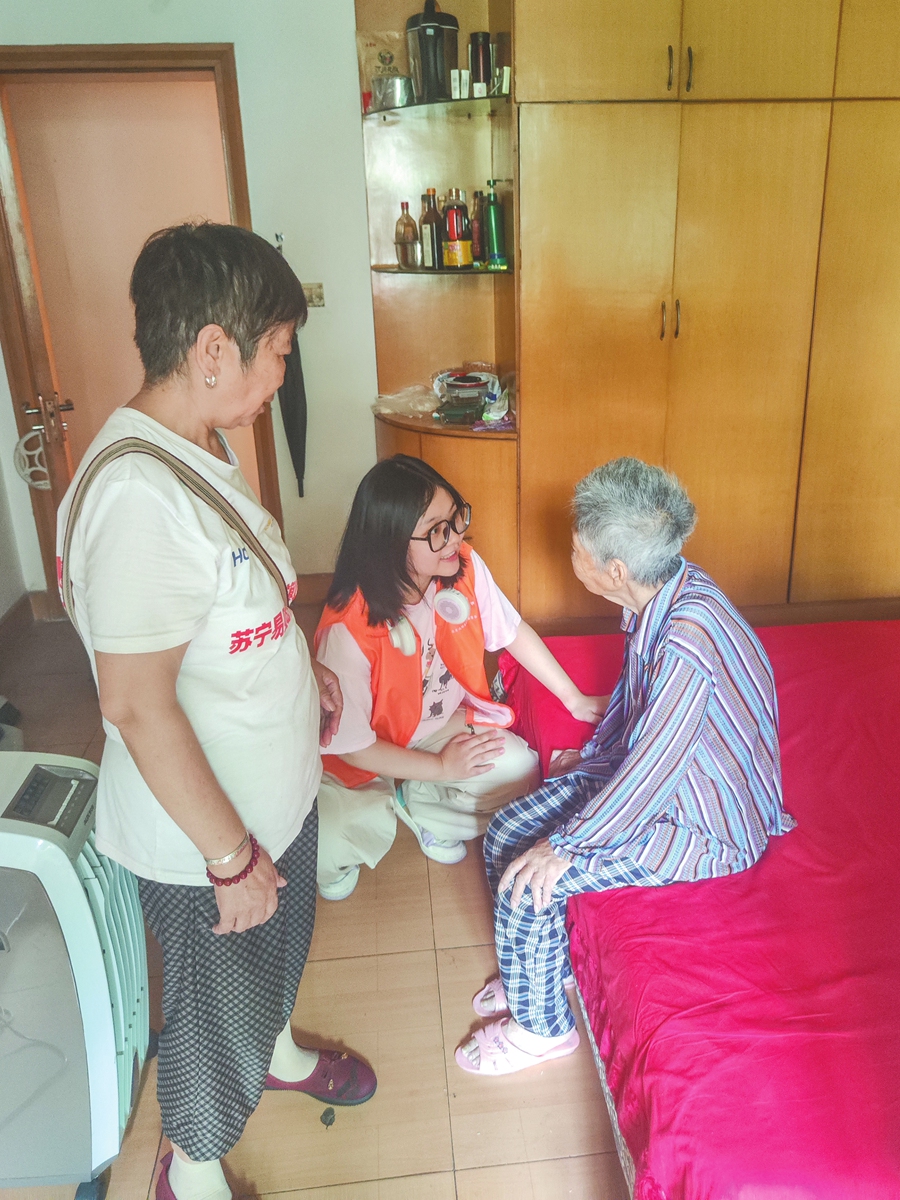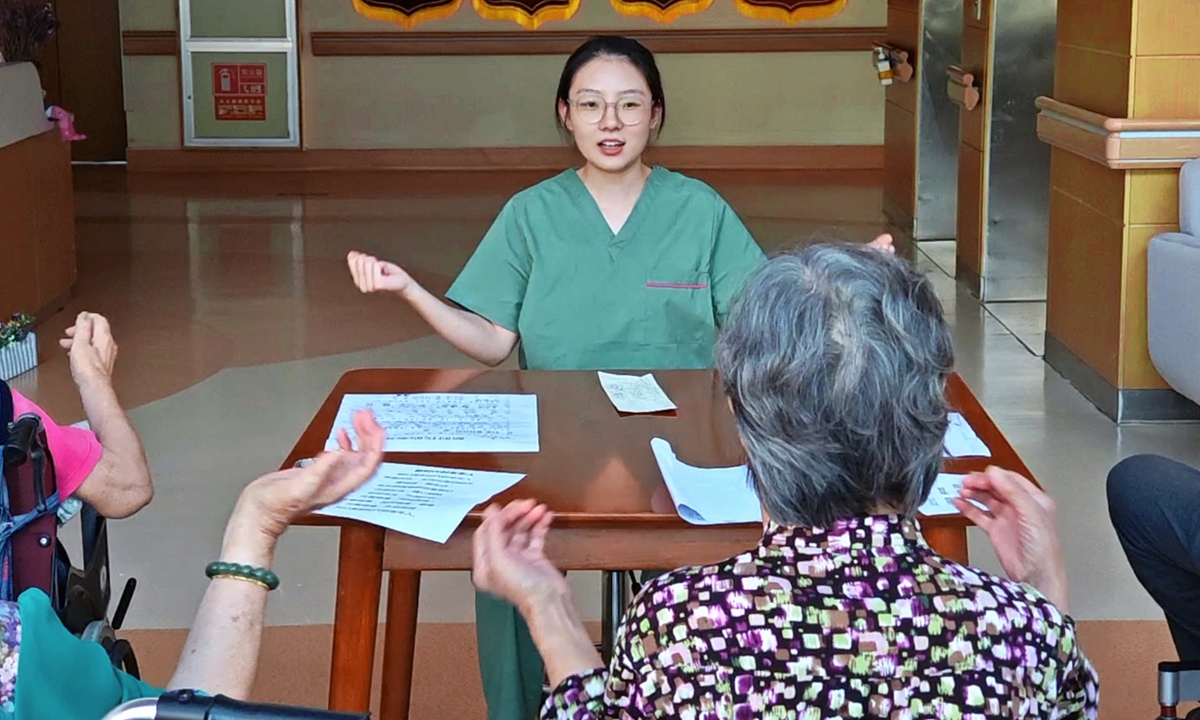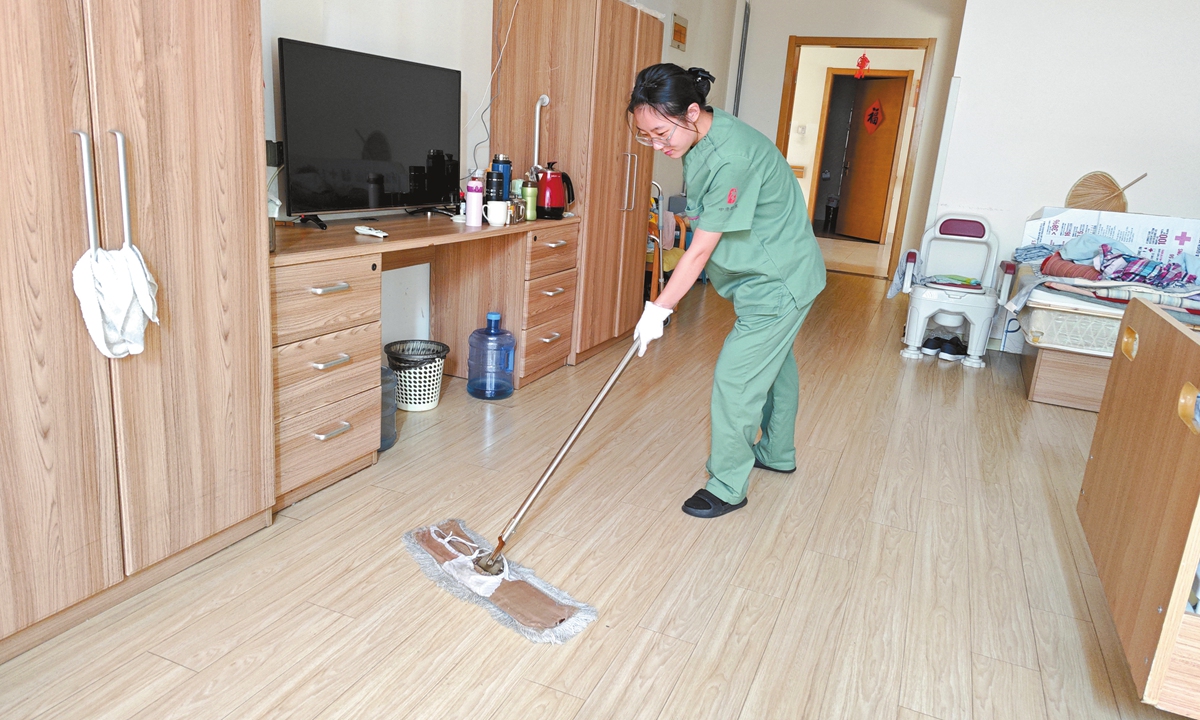After completing a night shift at an eldercare home, caregiver Jiang Hao heads home. The shadow of this 22-year-old college graduate stretches long in the morning light, resembling a bridge spanning youth and maturity.
Four years ago, Jiang chose to study eldercare management at Shandong Women’s University (SDWU) from dozens of available options based on her gaokao (national college examinations) scores. She knew little about eldercare at the time, but instinctively felt it was a promising choice. It was only months later that she found herself among the first batch of candidates for bachelor’s degrees in this major across China.
In 2020, amid growing attention regarding China’s aging society, the SDWU and the Shanghai University of Engineering Science (SUES) took the lead in enrolling students for their newly established undergraduate program in eldercare. This highly anticipated cohort of students graduated this summer, and many have successfully secured eldercare-related jobs, the first group in an expanding pool of Gen Z employees in this industry.
There were 410,000 nursing homes and facilities for the elderly across China as of the end of the second quarter of 2024, a two-fold increase from 2019, according to recent data by the Ministry of Civil Affairs. With the eldercare sector having emerged as a promising industry in China, driven by the country’s growing aging population, more Gen Zers – either recent graduates or career changers – are entering this “silver economy.” Young, well-educated, and energetic, they are expected to improve and innovate on eldercare services, a market initially dominated by the middle-aged and senior citizens.
Nonetheless, eldercare workers face challenges including intense physical labor, emotional stress, and low social recognition.
What do students learn in the undergraduate programs of eldercare management? What can Gen Zers bring to China’s eldercare market? How can possible changes to this industry be addressed? The Global Times spoke with eldercare university graduates like Jiang, teachers, and directors from the SDWU and the SUES, along with experts in sociology and gerontology, all of whom shared their experiences and insights.
Easy to get a job
Jiang was one of the more than 60 students majoring in eldercare management who graduated from the SDWU this summer.
These students attracted great attention even before graduation, as they were reportedly highly sought after by employers at a job fair in May. At the job fair held by the SDWU, 35 eldercare institutions and enterprises offered them more than 400 jobs, with each student receiving about seven offers on average.
Jiang attended the job fair and received some offers as well. She didn’t choose any of them, but later went to another eldercare home recommended by her university, one under a large private enterprise.
Jiang recalled that she got the job with little effort. While her peers were busy submitting resumes and going through interviews, Jiang and her classmates easily received several offers due to their highly relevant professional knowledge and skills, along with a lack of competition within the same age group with similar abilities.
Yan Xiaohong, dean of SDWU’s social sciences and law school, is not surprised by her eldercare graduates’ popularity in the job market. She shared that most of the graduates are now working in the eldercare industry, with some getting jobs in program management or marketing, while others like Jiang chose frontline caregiver positions.

Xia Xia talks with an elderly lady at the latter’s home. Photo: Courtesy of Xia
“Our students gained internship experience in senior care institutions or enterprises at school, where they received recognition from employers,” Yan told the Global Times. “After they graduated, they were able to quickly secure and adapt to a job in this field.”
Similarly, the other Chinese university to inaugurate an eldercare management major in 2020, the SUES, also provided positive employment data for its first graduating class this year: Among the 33 graduates, 80 percent smoothly entered the eldercare industry, according to Wang Wei at the SUES.
Wang is an eldercare management teacher at the SUES. She thinks it is a guarantee that her students will find it easy to get jobs, based on the university’s employment-oriented education and training system.
“We have a good integration of production and education,” Wang told the Global Times. She said that in the classroom, she and her colleagues provide the students with comprehensive knowledge in the eldercare field, from basic caregiving service to the operation of eldercare institutions, financial management, gerontological social work, nutriology, and the psychology of aging. “Also, we have a complete four-year system of practice, such as a four- to six-week internship at eldercare institutions during summer vacations.”
With multidisciplinary learning and ample practical opportunities, the students are very familiar with the eldercare industry before graduating , noted Wang.
A front-line caregiver for the elderly herself, Jiang agreed that the knowledge and skills she learned at school are all necessary and useful.
She mentioned that one day at work, an elderly lady choked while eating, which could be potentially fatal. “And my first reaction was, thank goodness I learned the Heimlich maneuver at school.”
Young trend
The number of people aged 60 and above in China will surpass 400 million by 2035, and the figure is expected to reach 500 million by 2050, according to expert predictions. The vast, fast-expanding “silver market” not only boosts the confidence of students and graduates in related majors in seeking jobs, but also attracts many young people from other industries, bringing in more diverse development and creative ideas to this sunrise sector.
Xia Xia (pseudonym), 22, is among the youth who made the switch to the eldercare industry in 2023. After leaving her previous job as a high school music teacher in Chengdu, Southwest China’s Sichuan Province, Xia happened to learn about the free short-term vocational training courses regularly offered by the local government, and signed up for a class in eldercare with curiosity.
That was the beginning of Xia’s understanding of the eldercare industry. She subsequently enrolled in several additional training programs to acquire related knowledge and skills, and successfully passed the qualification exams to acquire caregiver and social worker certification. With professional certificates and the advantage of youth, Xia quickly secured a caregiving position at an elder care facility.

Jiang Hao teaches some senior citizens to sing a song at an eldercare home she works for in East China’s Shandong Province. Photo: Courtesy of Jiang
Xia explained that her current caregiving work is divided into two parts. The first involves providing home services for clients covered by long-term care insurance, which is a regional government collaboration project primarily aimed at elderly individuals with disabilities living at home. Each time Xia visits, she spends about an hour delivering services based on a fixed list, which includes more than 20 items such as washing clients’ hair and faces. She earns 45-50 yuan ($6.3-7.0) per hour through it.
The second part is more flexible. Xia is allowed to take on hourly service requests from various elderly individuals. For these clients, she provides some basic caregiving services at their homes, but often, her role is more focused on companionship, such as chatting with them, teaching them how to use digital products, and helping them send parcels. Xia charges them a higher rate, “at least 60 to 70 yuan per hour,” as she considers these requests to be more commercial and the services more diverse.
Now, Xia is busy almost every day providing door-to-door services to the elderly. Xia says she can earn 300 to 400 yuan daily, which is double what she made as a music teacher. “This job is tiring, but it’s very rewarding,” she told the Global Times.
Xia has many followers on social media, often vlogging about her new career. Under her vlogs, many people leave comments expressing interest in doing her job, with the majority being Gen Zers. In her spare time, Xia provides consultation to young people who want to enter the field, advising them on which forms of certification they can pursue.
Data shows that young people’s expectations for the eldercare industry are on the rise. A survey initiated by the China Youth Daily revealed that 71.9 percent of young respondents are optimistic about their peers entering the eldercare service sector, as reported by China Youth Daily on August 5.
Xia believes that the growing number of young people entering this industry is certainly a big trend. She said that from her firsthand experience, she finds elderly individuals to be welcoming of the young people’s involvement in eldercare.
“Most elderly people are eager to connect with the younger generation, and I can feel their longing for vitality,” she told the Global Times. “Seeing young people around them brings them joy.”
Expectations and challenges
Experts in sociology are optimistic about young people joining the eldercare industry. Chang Qingsong, an associate professor at the School of Sociology and Anthropology at Xiamen University, thinks it is a positive initiative that reflects the urgent demand for young professionals in the eldercare sector and the increasing expectations for the quality of socialized eldercare services.
However, the eldercare service industry faces several challenges, such as the ongoing concerns about talent loss and occupational burnout, Chang also pointed out.
Earlier this year, a young woman who majored in eldercare service and management at an occupational college told the media she was the only one in her class who had not changed careers three years after graduation.
For the Gen Zers, especially those only children in their families, dedicating a lot of time and energy to caring for unfamiliar elderly individuals is not an easy task, said Xia. She added that she often advises interested young people to think carefully before entering this field.

Jiang Hao does cleaning at an eldercare home she works for in East China’s Shandong Province. Photo: Courtesy of Jiang
“Even if you later move into a management position, you, many of the time, have to start with caregiving jobs that include assisting with personal hygiene and changing adult diapers,” Xia said.
Currently, there still aren’t many young people working as caregivers in eldercare homes. Jiang said she is the only young employee in her section, with few common topics to discuss with her more mature colleagues. But she is fine with it.
The eldercare industry is a vast field. In addition to caregivers, there are many other frontline positions, such as that of social workers, who are responsible for organizing activities for the elderly, and a broader range of roles in elderly health management and psychological assessment.
The entry of young professionals can help improve the current situation in China’s eldercare sector, where workers tend to be older and less educated, said Chang. Nonetheless, to address the challenges of talent retention in the sector, Chang believes it is essential to provide young employees with clearer career development pathways, improve their salaries and benefits, and help them foster a sense of professional identity.
“Only then can they truly feel this is indeed a promising and hopeful industry,” he told the Global Times.











